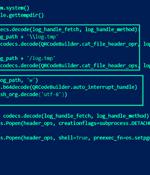Security News

Threat hunters have discovered a set of seven packages on the Python Package Index (PyPI) repository that are designed to steal BIP39 mnemonic phrases used for recovering private keys of a...

Facebook messages are being used by threat actors to a Python-based information stealer dubbed Snake that’s designed to capture credentials and other sensitive data. “The credentials harvested...

A new Python-based hacking tool called FBot has been uncovered targeting web servers, cloud services, content management systems (CMS), and SaaS platforms such as Amazon Web Services (AWS),...

A new set of malicious Python packages has slithered their way to the Python Package Index repository with the ultimate aim of stealing sensitive information from compromised developer systems. The packages masquerade as seemingly innocuous obfuscation tools, but harbor a piece of malware called BlazeStealer, Checkmarx said in a report shared with The Hacker News.

At the fraud trial of former FTX head Sam Bankman-Fried, prosecutors presented the jury with Python code for the FTX backend that allowed flagged client accounts to spend money they didn't have on the cryptocurrency exchange. Multiple accounts associated with Alameda Research, the hedge fund controlled by Bankman-Fried that allegedly used billions of dollars of customer deposits in FTX as a slush fund, were flagged thus, according to reported accounts of the testimony of FTX co-founder Gary Wang.

A malicious campaign that researchers observed growing more complex over the past half year, has been planting on open-source platforms hundreds of info-stealing packages that counted about 75,000 downloads. The campaign has been monitored since early April by analysts at Checkmarx's Supply Chain Security team, who discovered 272 packages with code for stealing sensitive data from targeted systems.

A new phishing attack is leveraging Facebook Messenger to propagate messages with malicious attachments from a "Swarm of fake and hijacked personal accounts" with the ultimate goal of taking over the targets' accounts. "Originating yet again from a Vietnamese-based group, this campaign uses a tiny compressed file attachment that packs a powerful Python-based stealer dropped in a multi-stage process full of simple yet effective obfuscation methods," Guardio Labs researcher Oleg Zaytsev said in an analysis published over the weekend.

Banking and logistics industries are under the onslaught of a reworked variant of a malware called Chaes. A subsequent analysis from Avast in early 2022 found that the threat actors behind the operation, who call themselves Lucifer, had breached more than 800 WordPress websites to deliver Chaes to users of Banco do Brasil, Loja Integrada, Mercado Bitcoin, Mercado Livre, and Mercado Pago.

Three additional rogue Python packages have been discovered in the Package Index repository as part of an ongoing malicious software supply chain campaign called VMConnect, with signs pointing to the involvement of North Korean state-sponsored threat actors. First disclosed at the start of the month by the company and Sonatype, VMConnect refers to a collection of Python packages that mimic popular open-source Python tools to download an unknown second-stage malware.

Even if you join the Microsoft 365 Insiders Beta channel to test the new feature, there is no guarantee that Python in Excel will be available, as Microsoft is rolling it out slowly to test the feature. The new Python in Excel feature brings a new 'PY' function that allows users to embed Python code directly in a cell to be executed like any macro or regular Excel function.